4 Things your Doctor will say about Hashimoto’s which are absolutely False
Hashimoto’s thyroiditis is the #1 cause of low thyroid in the United States.
And despite the fact that overwhelming numbers of patients suffer from Hashimoto’s, doctors are still mostly clueless when it comes to this condition.
Why are doctors so wrong when it comes to this condition and what can you do about it as someone who suffers from Hashimoto’s?
That’s exactly what we are going to talk about today.
You will learn:
- Common myths that your doctor will say about Hashimoto’s that are completely false.
- How doctors think about Hashimoto’s as a condition and why it leads people with Hashimoto’s to suffer
- Treatments that actually work for Hashimoto’s that will not be recommended by your doctor
- And additional medications beyond levothyroxine that can be used to treat Hashimoto’s
Let’s jump in…
DOWNLOAD FREE RESOURCES
Foods to Avoid if you Have Thyroid Problems:
I’ve found that these 10 foods cause the most problems for thyroid patients. Learn which foods you should avoid if you have thyroid disease of any type.
The Complete List of Thyroid Lab tests:
The list includes optimal ranges, normal ranges, and the complete list of tests you need to diagnose and manage thyroid disease correctly!
#1. Hashimoto’s is just a thyroid condition
FALSE!
Your doctor may lead you to believe that Hashimoto’s is a thyroid condition but they are completely wrong.
Hashimoto’s is more than just a thyroid disease.
It is a combination of an autoimmune disease AND a thyroid problem.
This small modifier makes all of the difference.
The fact that Hashimoto’s is an autoimmune disease changes completely how both you and your doctor should look at the disease.
Autoimmune diseases stem from very specific problems in the body.
We know from research that certain problems tend to trigger autoimmune diseases and these problems can actually be treated and managed.
Leaky gut (1), nutrient deficiencies, exposure to infections/viruses (2), diet, and genetics all play a role in triggering autoimmune disease.
And many of these conditions can be treated and managed (we will talk more about some of these below).
But if you look at Hashimoto’s as ONLY a thyroid condition then you will completely miss out on the opportunity to even look into these other issues.
One of the biggest mistakes you can make is to think that Hashimoto’s is just a thyroid condition and I can guarantee that this is something that will be pushed by your doctor.
The thyroid component of Hashimoto’s is definitely important and one that should be treated as well, however.
#2. Hashimoto’s is not curable or reversible.
FALSE!
There is no doubt that your doctor looks at Hashimoto’s as an incurable condition that you will have to live with for the rest of your life.
Doctors are taught to take the “sit and wait” approach to treat Hashimoto’s.
They literally sit and wait until your thyroid gland destroys itself and you require thyroid medication.
And once you start thyroid medication they will say that you have to be on it for the rest of your life.
The attitude and treatments that they recommend all point to the fact that they believe Hashimoto’s will be stuck around with you forever.
But it definitely doesn’t have to be that way.
There are numerous patient reports from women with Hashimoto’s who have been able to manage and even reverse their condition.
I’ve written about some of these experiences in case studies here.
Does this mean that all cases of Hashimoto’s will be curable?
Not necessarily, but just because not all cases can’t be cured doesn’t mean you shouldn’t try in each and every case.
Would you rather sit and do nothing while your own body destroys your thyroid gland and you become permanently reliant upon thyroid medication for the rest of your life or get out and at least TRY to prevent or reverse your condition?
I would be willing to bet that you would at least want to TRY to do something to prevent that from happening.
But if you talk to your doctor about it they probably won’t even mention other options or talk about the fact that Hashimoto’s can potentially be reversed.
Occasionally, you will see a doctor say something like 20% of Hashimoto’s cases will spontaneously resolve but I would bet that most doctors don’t even know that this is a possibility.
#3. The best treatment for Hashimoto’s is levothyroxine.
FALSE!
This is another huge issue for women with Hashimoto’s.
Once your thyroid reaches a certain point of destruction and your TSH elevates to a specific level (this is different depending on which doctor you go to and what they believe) you will no doubt be started on levothyroxine.
Levothyroxine is the number 1 choice of thyroid medication by conventional doctors and they believe that it’s the BEST thyroid medication available.
There’s only one problem with this:
It’s not true.
I’m not saying levothyroxine is the worst thyroid medication of all time (though I would be willing to bet that some of you reading this would argue that point), but I am saying that it’s certainly not the best thyroid medication available for women with Hashimoto’s.
I can give many reasons but let me give you one really obvious and important reason that your doctor isn’t aware of.
Levothyroxine contains lactose.
The ingredient lactose monohydrate is found in all doses and concentrations of levothyroxine.
Hold this thought in your mind while I jump to a similar but different topic.
We know from studies such as this one (3) that dairy products can cause problems for women with Hashimoto’s.
In fact, when dairy is removed from the diet certain people experience an IMPROVEMENT in thyroid function within a few weeks.

And what ingredient is found in dairy products? You guessed it, lactose.
So why on earth would your doctor recommend a medication which contains an ingredient which is known to cause problems in Hashimoto’s patients?
I wish I had a good reason for you but it looks like a lack of knowledge is probably the best answer to that question.
Either way, you should know that there are MANY options available to you to treat Hashimoto’s and many of them are much better than levothyroxine.
Thyroid medications like…
Can all be used in place of levothyroxine or in conjunction with levothyroxine.
These medications aren’t perfect but they may work better in your body than levothyroxine and they are certainly worth looking into.
#4. Natural therapies like diet don’t work for Hashimoto’s
TRUE!
Just kidding, this is one definitely FALSE as well!
This is sort of an extension of problem #1 listed above.
If your doctor doesn’t appreciate that Hashimoto’s is both an autoimmune disease AND a thyroid disease then they may miss the fact that it can be treated with diet.
We know from studies such as this one (4) that diets like the AIP diet can dramatically improve other autoimmune conditions such as inflammatory bowel disease as well as Hashimoto’s.
Why wouldn’t we assume, then, that diet can play an important role in helping to treat and manage Hashimoto’s thyroiditis?
We don’t need to assume that this is the case because we have an endless number of case studies from women with Hashimoto’s who show that altering diet has an improvement in thyroid status.
I even just mentioned one study above.
Women who removed dairy from their diet saw an improvement in thyroid function.
I have also personally seen improvement in thyroid function in people using the AIP diet, the ketogenic diet, and a whole food-based diet.
Changing up your diet can positively impact your thyroid antibody levels and it may reduce inflammation in the body.
If you can reduce inflammation then you may be able to prevent or reverse thyroid gland damage from immune dysfunction and that’s exactly what you want to do.
There are many diets that have the potential to be effective in treating Hashimoto’s and I’ve included a few below that I’ve personally recommended and seen results with:
- AIP or autoimmune paleo diet
- Ketogenic diet
- Carnivore diet
- Gluten-free, dairy-free, soy-free diet
- Elimination diet
- Whole food diet
Why do doctors miss the boat when it comes to Hashimoto’s?
Unfortunately, in the eyes of conventional medicine, autoimmune diseases such as Hashimoto’s are not seen as treatable.
When doctors look at autoimmune diseases they see a chronic medical condition that is going to be around with the patient forever.
And while it is true that a great MANY people with Hashimoto’s will continue to suffer for a long time, much of this suffering may be propagated by the fact that doctors fail to recommend any additional treatments to their patients.
It’s almost like a self-fulfilling prophecy.
If you never even attempt to treat the autoimmune component of Hashimoto’s then you will never see patients recover and you will forever believe that they can’t get better.
In addition, doctors are taught that it’s fine to let your thyroid die because once it dies you can then be placed on thyroid medication.
They view the death of your thyroid as an inevitable result of Hashimoto’s thyroiditis and something that can be easily treated with some levothyroxine or thyroid medication.
What’s strange is that they don’t view other autoimmune thyroid conditions in the same way.
Take for instance rheumatoid arthritis.
Those with RA are given intense anti-inflammatory medications and immune suppressive agents because they don’t want the immune system to destroy the joints in these patients.
But for some reason, when it comes to the thyroid gland, they don’t even try or attempt to stop the destruction of the thyroid gland.
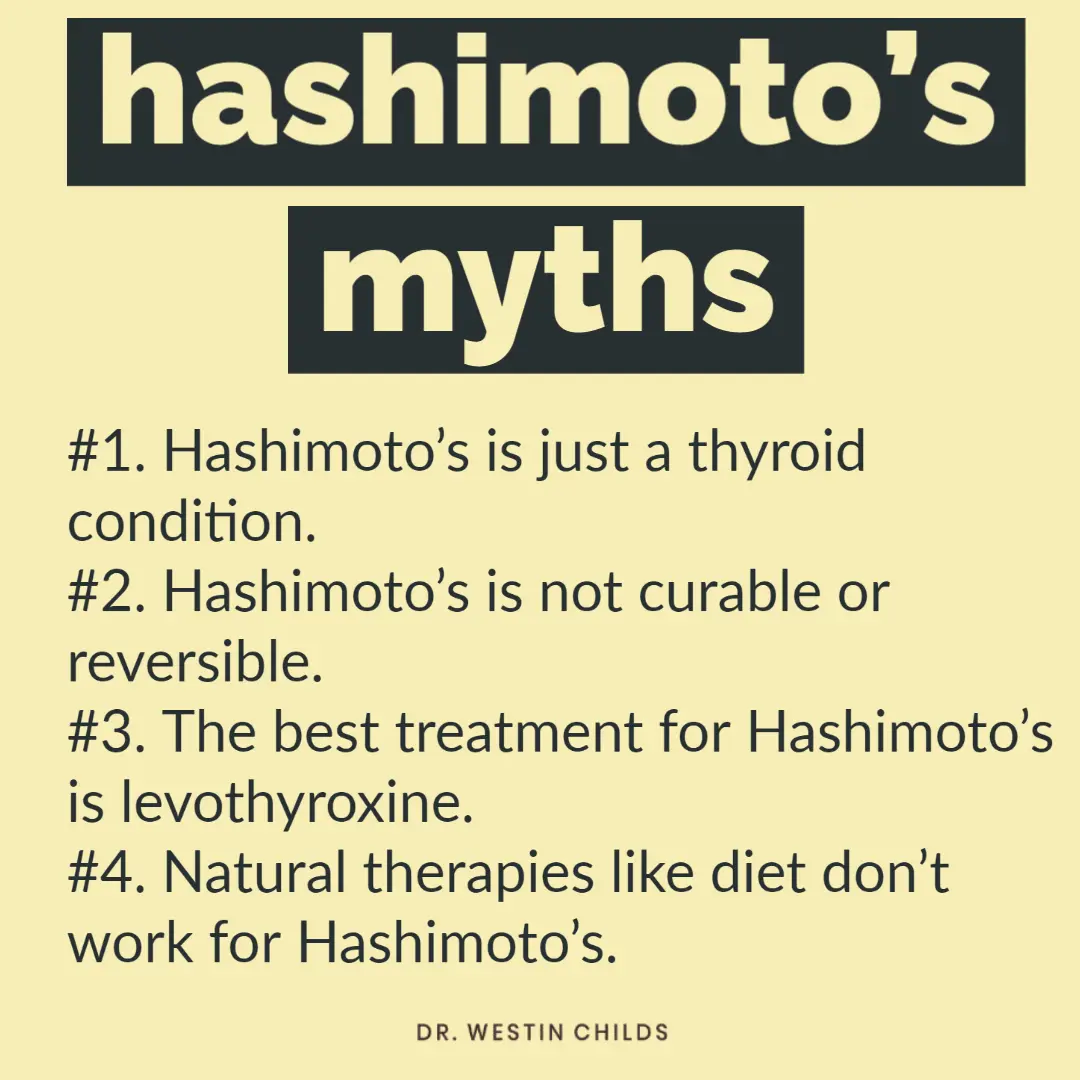
Doctors don’t even make recommendations for simple anti-inflammatory measures like they would in other autoimmune diseases.
And this approach really highlights how they look at thyroid function in general:
Managing low thyroid is easy because you can just slap a patient on thyroid medication.
This mindset misses the point of potentially PREVENTING the damage in the first place!
Who should you see to help you manage Hashimoto’s?
If traditional doctors aren’t well educated when it comes to Hashimoto’s then who should you see?
I’ve created a list of doctors and health care providers that are MOST likely to get you the best results:
- Doctors (or NPs and PAs) that specialize in integrative medicine
- Doctors (or NPs and PAs) that specialize in functional medicine
- Doctors (or NPs and PAs) that specialize in anti-aging medicine
- Doctors (or NPs and Pas) that specialize in bioidentical hormone replacement therapy
- Some Naturopaths – Naturopaths tend to take a more holistic approach to healthcare but you will also find some that essentially mimic the care given by endocrinologists.
- Some chiropractors – Some chiropractors are very knowledgeable about Hashimoto’s and may be able to help. But do note that chiropractors cannot prescribe medications so they will only be able to help with diet, supplements, and other natural therapies.
- Some Health/lifestyle coaches – Health coaches and lifestyle coaches can be helpful if they are knowledgeable. I’ve used several health coaches and they’ve been invaluable in helping patients stay on the path and maintain commitments to their diet and lifestyle.
Doctors to AVOID:
- Most endocrinologists
- Most family practice doctors
Endocrinologists and family practice doctors are what I refer to as conventionally trained and will most likely propagate the myths that we just talked about.
While 99% of them think this way, it is possible to find the 1% who are willing to explore new therapies and unconventional treatments.
So don’t give up on all of them but don’t waste too much time on them either.
Final Thoughts
It’s my belief that doctors are severely undereducated when it comes to managing the autoimmune thyroid condition known as Hashimoto’s.
But this doesn’t mean that you have to continue to suffer.
You can take your health into your hands with resources such as this which can help you do things such as changing your diet, taking the right supplements, and looking at alternative therapies.
These therapies may help you to PREVENT or REVERSE your Hashimoto’s disease.
Now I want to hear from you:
Do you think that your doctor understands Hashimoto’s?
Do you trust him/her to treat you effectively?
What type of doctor are you currently seeing? Are you planning on changing doctors or getting a second opinion?
Have you had success with alternative or integrative therapies?
Leave your questions or comments below!
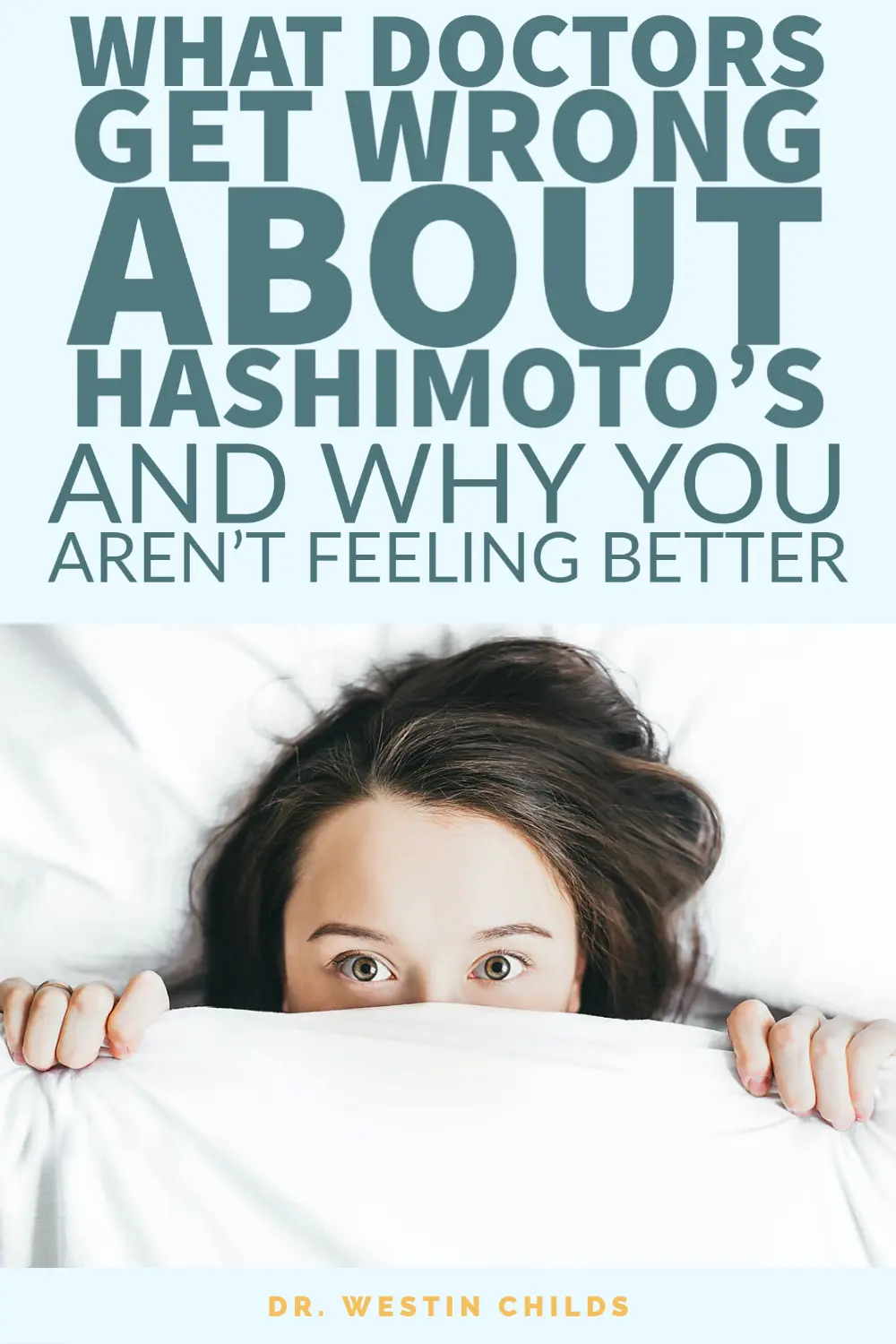
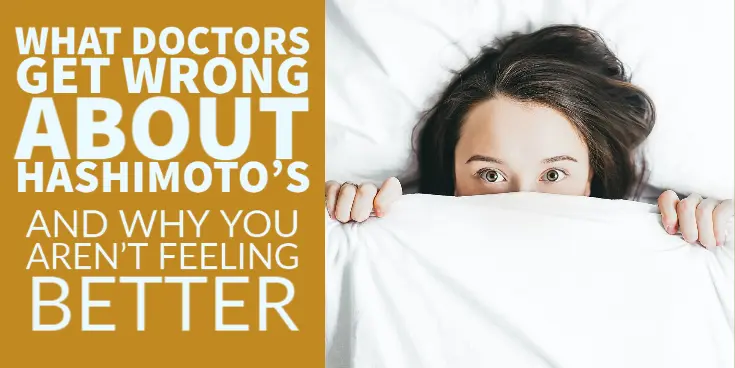


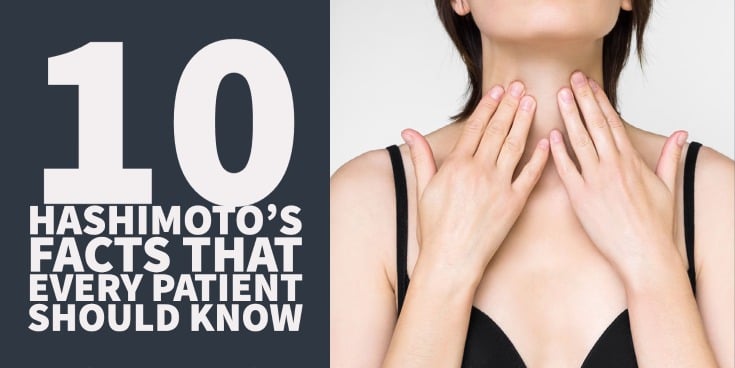


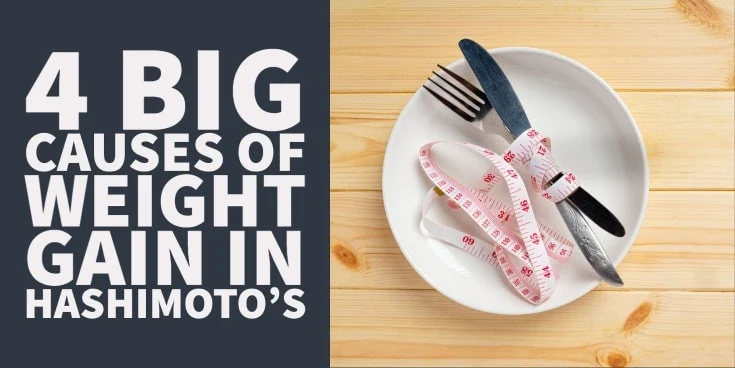

I was diagnosed with Hashimotos 30 years ago. I am a white male 60. Once my doctor got me on the right dosage (137mg)of Synthroid, I have not experienced any ill effects. Are there other treatments that are available so that I don’t have to take Synthroid for the rest of my life?
I was diagnosed with hypothyroid when I was 13. I have been on Armour Thyroid since then. When I was in my late 20’s early 30’s I was told I had Hashimotos thyroiditis. But nobody either wanted to or knew how to treat it.I have been to every kind of doctor trying to get myself to feel better. All they run is a TSH uptake or just a TSH and T3, T4, and maybe a T7. I’m not sure anymore. I’m seeing a new doctor and requested some different thyroid tests and she said my insurance might not cover them but she would put them on the order. No one has ever told me about any other thyroid medications other than synthroid. I live in Arizona in a small city about 2 hours away from Phoenix.
I can’t believe you would recommend NP from the pig. I think l read this is where the first thyroid came from. A shortage of pigs happenened so around 1970 and or 1980 scientists went to the labs and a miracle happened. They discovered how to make thyroid medications without a pig. Thank God as the Bible teaches we humans are not consume any pork. I have taken this NP for a year and have had serious problems. I am on levothyroxine for a month now and am improving but will see what my blood tests show In a month. Follow the dietary laws in the Bible and health can be at least sustained.
Ive been seeing a Chiropractor for 2 years since the start if my Hashimotos, I was put on supplements and felt alot better but my labs were steadily getting worse so now I see an endocrinologist as well. When she asked why I hadn’t started medication at the start of my diagnosis she pretty much told me a chiropractor isn’t reliable, (even worse my family doctor told me chiropractors aren’t real doctors, which made me furious). My endocrinologist made me feel stupid for asking questions about other testing because my family doctor didn’t order a full thyroid panel like I asked so we were going of my t4 and tsh. I dont trust my endocrinologist. But where I am I find it highly unlik ill find someone more reliable theyre all the same.
I have been a type 1 diabetic since I was 12. When I was 48 I went into menopause and then found out I have had Hashimotos. My doctor put me on sythroid. I tell her about my symptoms and she says nothing. She tells me my levels are good. I feel some fatigue and joint swelling and pain. I am on some of your supplements but my TPO is still elevated. My doctor tells me my thyroid is being attacked but does not offer any suggestions. She said I can’t go on any of the diets because of the diabetes. I know it’s a process of elimination and I know my triggers. Feeling frustrated!
I was diagnosed with thyroid cancer 3 years ago and had to have it removed. Been on natural thyroid pills …now NP thyroid and would like to see you write articles on those of us who have no thyroid any longer and MUST rely on medicine to survive. I am doing well on NP 90 mg.
Hi Ann,
I can certainly add more to the list of future articles 🙂 I have plenty already that you can take a look at as well and pretty much everything that applies to someone with low thyroid applies to those without a thyroid.
I’m a follower and believe in a lot of what you say. However to explicitly say to avoid most endos and GPs is a little irresponsible and dangerous. They aren’t a right fit for some but are for many, many people. That point you made really surprised me.
Hi Laura,
Endo’s and GP’s should be the last option but they are certainly still better than nothing.
Thanks to Dr Childs posts and his way of teaching us how to be aware of thyroid problems I am on the right track for health improvement. I consulted an endocrinologist who has taken me of Levothyroxine which has never worked for me, and put me on Armour thyroid. However he didn’t carry out all the tests (in spite of my providing Dr Childs list) and so I don’t know if I have Hasimotos or just hypothyroidism! I need to Perdue this with Fr Chils guidance. So greatfull to have found him!
Cherry Spyer
UK